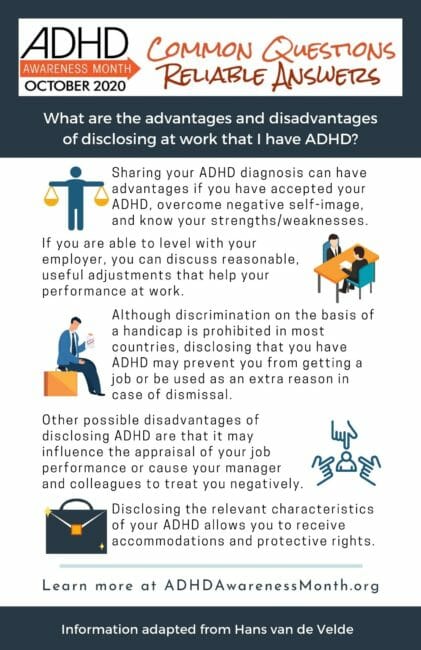The main rule is that an employee or someone applying for a job is not obligated to report medical diagnoses to the employer. However, where certain personal characteristics hamper the performance of (part of) the job, it may be necessary to report these characteristics apart from actually mentioning the name of this brain property called ADHD. More and more employers have an HR culture that is open to people with ADHD, etc. In those cases, it is advisable to disclose that you have ADHD. This has obvious advantages, but can, in other cases sometimes, also have disadvantages.
Possible disadvantages are: Although in most countries discrimination because of a handicap is prohibited (UN treaty on disabilities), you may not get the job or it may even be an extra reason in case of dismissal. The employer can conceal these reasons. It could also influence the appraisal of your job performance. Another reason not to be explicit about your ADHD could be that your manager or colleagues may treat you negatively at work. Or, in some cases, colleagues can overshoot the mark in their helpfulness and thus regard you as a not fully-fledged “disabled person.”
It helps if you have accepted your ADHD. If you have overcome your negative self-image and know your strengths and weaknesses, sharing your diagnosis can have advantages. If you are able to level with your employer that “the right person at the right place” favors both sides, you can discuss reasonable, useful adjustments, like job-carving, having a colleague as a buddy or a concentration room, or even working part of the week at home; whatever can help your performance. So, bring forward the relevant characteristics of your ADHD and get the position that fits to your qualities. No disclosure including the diagnosis of ADHD means no adjustments and no special rights.
About the Author

Hans van de Velde, entrepreneur and employer since 1989 and coach since 1998, has ADHD and dyslexia himself. As a volunteer he is active in the Dutch association for people with ADHD etc. and member of the board of ADHD Europe. He started the foundation ‘European Brains @ Work’ that helps employers to make more profit with the 10% of their employees that have a special brain like ADHD, dyslexia, autism and giftedness.
Read more here:
- CHADD workplace issues: Informative including reasons to disclose or not.
- ADHD in the workplace: A three-step formula to prepare the talk with your boss.
- ADDitudemag take it one step at the time: Be careful, prepare and go for it step by step if you need to disclose to get accommodations.
- Disclosure ADHD Minimize Risk of Social Rejection (sum): Preventative disclosure may greatly reduce Socially Rejecting Attitudes
- Disclosing Your Diagnosis at the Workplace (Canada): “You may be required to educate your employer on ADHD since misinformation continues to exist.”
- BMC Psychiatry in 2013: “Occupational Health was not wholly integrated and used as a means of making positive changes to the workplace, but rather as a superfluous last resort that employers tried to avoid.

